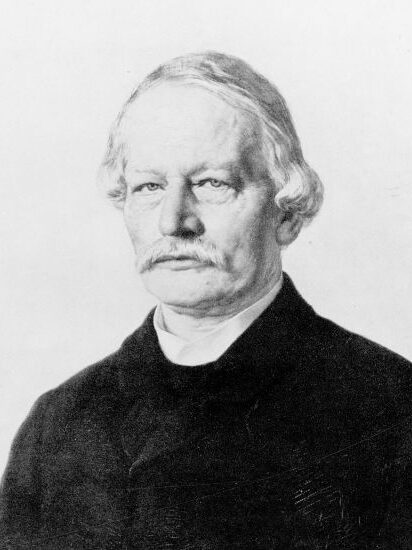Freytag, Gustav
Writer, editor
Born: July 13, 1816 in Kreuzburg, Silesia
died: April 30, 1895 in Wiesbaden
The son of a doctor and mayor, he studied philology in Breslau and Berlin, habilitated on Roswitha von Gandersheim and worked as a private lecturer in Breslau from 1839 to 1847. From 1848 to 1870, he took over the editorship of the journal "Die Grenzboten", which became the leading national liberal organ in Germany. The co-editor Julian Schmidt formulated the program for realistic literature here, which Freytag fulfilled in 1855 with his successful novel "Soll und Haben". The working German bourgeoisie, especially the merchant class, is portrayed as the bearer of culture and progress, sharply differentiated from Poles, aristocrats and Jews. This was followed by "Die verlorene Handschrift" (1864), a novel about the educated bourgeoisie, and the novel cycle "Die Ahnen" (1872-80), Freytag's bourgeois-liberal interpretation of German history, prepared by the cultural-historical "Bilder aus der deutschen Vergangenheit" (1859-67). Freytag's drama "Die Journalisten" (1854) became a regular repertoire piece, and his textbook "Die Technik des Dramas" (1863) was widely quoted.
Politically, Freytag advocated a unified small German state under the leadership of Prussia, from 1867 to 1870 also as a member of the Reichstag of the North German Confederation. He was friends with Duke Ernst II of Saxe-Coburg-Gotha and moved to Siebleben near Gotha in 1851. He was later unable to tolerate the wintry climate there due to bronchitis and therefore bought a house in the milder Wiesbaden on the "Rondell" on Biebricher Allee in 1877. There - far away from his main residence - he accommodated his housekeeper Marie Dietrich and their two sons; he did not marry her until 1879. His first wife, who had a nervous condition, had died in 1875.
In 1881, the family moved into a late classicist villa on Hainer Weg (today Gustav-Freytag-Straße 18). Freytag lived a rather secluded life in Wiesbaden - no doubt also due to his less "bourgeois" private life. His second wife also suffered from a nervous disorder, which was exacerbated by the death of their younger son in 1884; Freytag had her taken to a sanatorium near Koblenz. He had already met the Viennese Anna Strakosch, the wife of a well-known reciter. Their correspondence began in 1884, and after a vacation together in 1887, the 70-year-old author's letters to the 34-year-old Jewish woman became love letters; at times Anna lived in Freytag's villa. After divorcing, the two married in 1891 and the new Freytag couple participated more frequently in Wiesbaden's social and cultural life. The writer worked here on the complete edition of his works, for the first volume of which he wrote his "Erinnerungen aus meinem Leben" (1886). He caused another political stir in 1889 with his essay "The Crown Prince and the German Imperial Crown", in which he claimed that the 100-day emperor Frederick III had been incapable of active government long before his illness began. The city of Wiesbaden honored Freytag on his 70th birthday in 1886 by naming the street where his house was located after him. In 1905, the Gustav Freytag monument was unveiled in Wiesbaden's Kurpark.
Literature
- Freytag, Gustav
Letters to his wife. Berlin 1912
- Jung, Wolfgang
"That's not my genre, is it?". The old Gustav Freytag in Wiesbaden. In: Wiesbaden. Backyard and spa concert. An illustrated history of everyday life from 1880 to the present day. A publication of the Wiesbadener Geschichtswerkstatt e.V., Gerhard Honekamp (ed.), Gudensberg-Gleichen 1996 (pp. 31 - 33).
